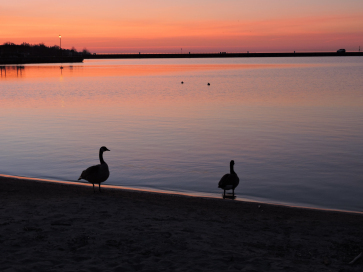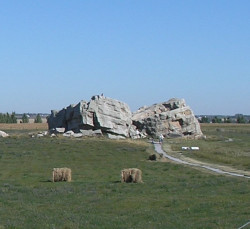Eric E. Wright's Blog, page 32
April 20, 2016
Gilded morning
“When morning gilds the skies, my heart awaking cries;”
Beauty still prevails
Shining above the ugly and the evil
Above a world darkened by hatred and greed
“Yes, wrong will fail, the right prevail with peace on earth good will toward men.”
For around this spinning globe millions of little suns reflect the light of the Son upon the blighted lives of the persecuted, the hurting, the despondent, the careless, and the cruel.
 These thoughts came to me one morning when I couldn’t sleep beyond 5:30. Instead of tossing and turning, I ventured down to the waterfront to watch the sun rise. I found the ducks and geese already up. As very gently, very slowly rainbow a kaleidoscope of light spread around, my mouth fell open in wonder. Such splendour. Such magnificence. Such pervasive loveliness.
These thoughts came to me one morning when I couldn’t sleep beyond 5:30. Instead of tossing and turning, I ventured down to the waterfront to watch the sun rise. I found the ducks and geese already up. As very gently, very slowly rainbow a kaleidoscope of light spread around, my mouth fell open in wonder. Such splendour. Such magnificence. Such pervasive loveliness.
The first words of a hymn came to mind, “When morning gilds the skies, my heart awakening cries, may Jesus Christ be praised.” But as the Christmas carol says, wrong seems to prevail.
The night before, as was my wont, I had watched the TV news. Such a depressing litany of human depravity and natural catastrophe. Theft. Murder. Road rage. Flooding Internet hacking. Exploitation. Earthquakes. More and more terrorist bombings and threats. Streams of refugees fleeing destruction and death. And through it all an election campaign
Such a depressing litany of human depravity and natural catastrophe. Theft. Murder. Road rage. Flooding Internet hacking. Exploitation. Earthquakes. More and more terrorist bombings and threats. Streams of refugees fleeing destruction and death. And through it all an election campaign
that makes one wonder whether sanity has abandoned our friends to the south—not that we in Canada would be much different if subjected to such a system.
BUT! The sunrise reminds us that beauty and goodness and purity still live on our darkened planet.
With the sunrise, I remember that Jesus Christ, the Lord is at work around the world. This sun of righteousness i s continuing to shed his light through his redeemed children. Little points of reflected light are comforting the bereaved, healing the sick, encouraging the discouraged, sharing good news with the despairing. Establishing schools. Manning
s continuing to shed his light through his redeemed children. Little points of reflected light are comforting the bereaved, healing the sick, encouraging the discouraged, sharing good news with the despairing. Establishing schools. Manning
hospitals. Running orphanages. Teaching literacy. Translating the Word of life. Gathering God’s new covenant children. Distributing relief. Sowing seeds of kindness and gentleness and godly purpose. Challenging cruelty.
The sunrise brings a new day. Those who stumbled yesterday, can rise today with hope.  Those who sinned yesterday may find forgiveness today. There is wisdom for new challenges. There is strength for ongoing trials. There is love for the unlovely. There is a new batch of patience for those who blew it yesterday. There is release for the captives. There is deliverance for the addicted. Anything is possible!
Those who sinned yesterday may find forgiveness today. There is wisdom for new challenges. There is strength for ongoing trials. There is love for the unlovely. There is a new batch of patience for those who blew it yesterday. There is release for the captives. There is deliverance for the addicted. Anything is possible!
God is the God of new days, of second chances, of grace and mercy and love. Believe it doubting soul!


March 16, 2016
Gone Home
 Oh, to be home! Although trite, the saying is true, there’s no place like home. Long trips or vacations away from home eventually create in most of us an overpowering longing to get home. Back where we can sit in our favourite chair, sleep in our own bed, make our own coffee.
Oh, to be home! Although trite, the saying is true, there’s no place like home. Long trips or vacations away from home eventually create in most of us an overpowering longing to get home. Back where we can sit in our favourite chair, sleep in our own bed, make our own coffee.
I can’t imagine the trauma suffered by today’s refugees. Their homes destroyed. Their towns in ruins. Loved ones scattered or dead. They need to establish a new home. Fortunately, Canada and other countries offer some refuge…but to a limited number. Millions more scatter throughout Europe. Millions moulder in crowded camps in Lebanon, Jordan, and Turkey. Homeless.
Europe. Millions moulder in crowded camps in Lebanon, Jordan, and Turkey. Homeless.
We are extremely fortunate in the North America to have escaped the devastation of war. We take having a home for granted—for 20, for 60, for 90 years. But what about having a home forever?
A childhood friend died last week. Fortunately, his family and friends do not grieve as many do who believe that death is extinction—a dead-end. While this friend was alive he read and believed reports from beyond the grave.
He read Jesus words; “I am the resurrection and the life. He who believes in me will live even though he dies and whoever lives and believes in me will never die” (John 11:25,2 6). He read Jesus promise, “Do not let your hearts be troubled. Trust in God; trust also in me. In my Father’s house are many rooms…I am going there to prepare a pace for you…that you also may be where I am” (John 14:1-3). He believed.
6). He read Jesus promise, “Do not let your hearts be troubled. Trust in God; trust also in me. In my Father’s house are many rooms…I am going there to prepare a pace for you…that you also may be where I am” (John 14:1-3). He believed.
He read Paul’s testimony; “What I received I passed on to you as of first importance; that Christ died for our sins according to the Scriptures, that he was buried, that he was raised on the third day according to the Scriptures, and that he appeared to Peter, and then to the Twelve, after that, he appeared to more than five hundred of the brothers at the same time, most of whom are still living” (1 Cor. 15:3-6). And this friend believed.
Though he suffered terribly through cancer, he trusted in Jesus Christ alone for his salvation, found peace…and now he has gone home. Really gone home. There is no home like heaven!
He has joined the throng around the throne who sing; “Hallelujah! For our Lord God Almighty reigns” (Rev. 19:6). He has joined uncounted multitudes who are invited to the wedding supper of the Lamb. (Rev. 19:9). He has gone to that astonishing place where “the dwelling of God is with men, and he will live with  them. They will be his people, and God himself will be with them and be their God. He will wipe every tear from their eyes. There will be no more death or mourning or crying or pain, for the old order of things has passed away.…No longer will there be any curse…there will be no more night. They will not need the light of a lamp or the light of the sun, for the Lord God will give them light” (Rev 21:3,4; 22:3-5).
them. They will be his people, and God himself will be with them and be their God. He will wipe every tear from their eyes. There will be no more death or mourning or crying or pain, for the old order of things has passed away.…No longer will there be any curse…there will be no more night. They will not need the light of a lamp or the light of the sun, for the Lord God will give them light” (Rev 21:3,4; 22:3-5).
No wonder Paul cried out in jubilation; “O death where is thy sting” (1 Cor. 15:55)! Are we among those who have a heavenly home or will hell be our eternal dwelling place? And this not because we were more righteous or religious than others, but because we are forgiven for Jesus’ sake. We can look forward to a heavenly home, like my friend, because of Good Friday and Easter.


February 29, 2016
Worried? -Think God! #3
Climbing the highest mountain? No. Knowing God is the greatest human pursuit. But how is that possible when He is invisible and incomprehensible in His divinity?
Like discovering the qualities of an artist in his painting, or a sculptor in his sculpture, we discover much about the invisible God in his visible, created works. “Since the creation of the world God’s invisible qualities—his eternal power and  divine nature—have been clearly seen, being understood from what has been made, so that men [you and I] are without excuse [if we ignore and fail to glorify God for his creation] (Romans 1:20).
divine nature—have been clearly seen, being understood from what has been made, so that men [you and I] are without excuse [if we ignore and fail to glorify God for his creation] (Romans 1:20).
Besides displaying his power and divinity in creation, God has given us, in the Bible, a host of understandable comparisons to use in learning about Him. These similes and metaphors unveil his invisible attributes in ways we can comprehend. Wonderfully, a host of them are aimed at dispelling our worries.
For example: “The Lord God is a sun…no good thing does he withhold from those whose walk is blameless” (Psalm 84:11). Plants lift their leaves to drink in the sun’s energy transforming it through photosynthesis into food. Solar panels all over world draw energy from sunshine. We have coal and oil and natural gas because of the sun. Like our sun, God is the source of all the blessings—usually unnoticed—that pour into our lives. God’s goodness is unsearchable.
God is our shelter. “Lord, you have been our dwelling place throughout all generations” (Psalm 90:1). “He who dwells in the shelter of the Most High…He is my refuge…If you make the Most High your dwelling…no disaster will come near  your tent” (Psalm 91;1,2,9,10). We depend on buildings to shelter us from cold and ice blazing heat and torrential rain. God needs no shelter but invites us to find shelter and refuge from fear, discouragement, despair, and hopelessness in Him. In His arms we can find comfort and protection from evil.
your tent” (Psalm 91;1,2,9,10). We depend on buildings to shelter us from cold and ice blazing heat and torrential rain. God needs no shelter but invites us to find shelter and refuge from fear, discouragement, despair, and hopelessness in Him. In His arms we can find comfort and protection from evil.
God’s protection is impregnable. “My God is my rock” (Psalm 84:2) Threatened by enemies, David found in God the stability, protection and strength he needed to stave off despair and find courage. While the stock market falls, ISIS threatens, and our own health deteriorates we look around from something strong and stable, and find God to be our everlasting Rock.
God is our protector. Fleeing for his life from his murderous son, Absalom, David affirms, “you are a shield around me, O Lord” (Psalm 3:3) ”You alone, O Lord,  make me dwell in safety” (Psalm 4:8). Not just a shield on one side, but above and behind and beside, God can protect His children from all evil. And so we pray, “Deliver us from evil.”
make me dwell in safety” (Psalm 4:8). Not just a shield on one side, but above and behind and beside, God can protect His children from all evil. And so we pray, “Deliver us from evil.”
God is our refuge. David cried, “I have no refuge” (Ps 142:4) but at least 23 times
Scripture responds, “The eternal God is your refuge” (Deut.33:27). God loves to care for and protect suffering people. Canada and others countries offer refugees fleeing Syria and Iraq the safety and security they need. We who follow Christ are involved in that effort. And we long to point them to eternal refuge from the consequences of evil through faith in the suffering Saviour.

God is our unshakeable help. “Though the mountains be shaken and the hills be removed, yet my unfailing love for you will not be shaken nor my covenant of peace be removed, says the Lord who has compassion on you” (Isaiah 54:10) The eruption of Mount Vesuvius buried Pompei; earthquakes shake the Himalayas and the Rockies. Although, the most stable things we know change, God’s love for His people never changes. “God so loved the world that He gave His only begotten son that whoever believes in Him should not perish but have everlasting life” (John 3:16).
Thank You, Father, Son and Holy Spirit for revealing your love in understandable ways!
(Further articles, books, and stories at: http://www.countrywindow.ca Facebook: Eric E Wright Twitter: @EricEWright1 LinkedIn: Eric Wright )


February 22, 2016
Hurry Up–I’m Impatient!
 In our apartment we use the elevator often. When Mary Helen enters, she punches the button for our floor and waits patiently for the door to close and the elevator to ascend. Not me, when I enter, I punch the button for our floor and immediately the close-door button. I can’t wait a second or two for the door to close by itself.
In our apartment we use the elevator often. When Mary Helen enters, she punches the button for our floor and waits patiently for the door to close and the elevator to ascend. Not me, when I enter, I punch the button for our floor and immediately the close-door button. I can’t wait a second or two for the door to close by itself.
I’m impatient. Not a good quality. Life goes better with patience. In fact, everything goes better when garnished with patience.
We live in a very impatient age; in politics, in relationships, in fast-food gratification, in driving, and certainly in our faith.
Patience is an essential quality in those who raise children. Our granddaughter has been waiting a hour for a doctor to see her sick child. We know from experience she will have to show patience again and again over the years to see her son become a fine young man.
has been waiting a hour for a doctor to see her sick child. We know from experience she will have to show patience again and again over the years to see her son become a fine young man.
It takes a lot of patience to grow flowers and vegetables. Cultivation, fertilizing, planting, weeding, watering—all come months before the harvest.
Preparing a tasty curry requires patience. Since I enjoy the end result I’m forced to be patient—or buy a take-out.
It certainly takes patience to prepare a sermon or Bible lesson. Hours and hours
. Alternately, I can get up on a platform and wing it…and leave my hearers wondering what all that was about. As I’ve learned, it also takes enormous patience and perseverance to write a book.
Learning to be patient is a steep learning curve to which, so far, I see no end.
Christian character is s eriously flawed in anyone without patience. We naturally want to be blessed now, quickly. But, “for you have need of patience that after having done the will of God you might receive the promise”(Heb. 10:26). Becoming loving doesn’t just happen, and yet, “love is patient” (1 Cor. 13:4). Establishing a good marriage or a strong friendship doesn’t happen in a week or a month. We need to, ”be patient with everyone” ( 1Thess. 5:14) —our life-partner, friends, other drivers, colleagues at work, children, and yes, grumpy seniors.
eriously flawed in anyone without patience. We naturally want to be blessed now, quickly. But, “for you have need of patience that after having done the will of God you might receive the promise”(Heb. 10:26). Becoming loving doesn’t just happen, and yet, “love is patient” (1 Cor. 13:4). Establishing a good marriage or a strong friendship doesn’t happen in a week or a month. We need to, ”be patient with everyone” ( 1Thess. 5:14) —our life-partner, friends, other drivers, colleagues at work, children, and yes, grumpy seniors.
Becoming a mature, Christ-centred Christian takes years. There’s no magic formula. It requires patient application of the means of grace; daily devotions which include Bible study and prayer, fellowship with other Christians in church and outside of church. We need time to learn about forgiveness, what real worship is all about, how to endure pain and sickness redemptively. We may not like it but, “the trying of your faith worketh patience” (James 1:3, KJV).
God is not in a hurry. As the sovereign Lord of the universe, He knows how and when all things mesh together for our good and his glory. Those who know God echo David who said, “I waited patiently for the Lord,” even when he was in a slimy pit. (See Psalm 40:1.) Ah, yes, that’s why we should trust Romans 8:28 even when we’re in a serious jam. “We know that in all things God works for the good of those who love him, who have been called according to his purpose.”
Lord, please help me to be more patient!
(Further articles, books, and stories at: http://www.countrywindow.ca Facebook: Eric E Wright Twitter: @EricEWright1 LinkedIn: Eric Wright )


February 11, 2016
What Is God Like? – #2
Our granddaughter expressed amazement that 50 years ago we traveled half-way around the world without Google or a cell phone. She illustrates how hard it is to understand something beyond our experience.
If you have never seen a tava, you will give me a blank look if I use it in a sentence. But when I describe it as a thick, rim-less frying pan used for cooking thin, whole-wheat nan over a fire in Pakistan, you may be able to picture it.
We learn of the unknown by comparison with the known. So it is with the invisible God. He reveals Himself by comparison with what we know.
How much does God know? “Look to the heavens…He calls them [stars] each by name” (Is. 40;26). Astronomers estimate that there are a billion trillion stars in the observable universe! He knows each hair on our heads and each bird. (Mat. 10:29,30) David exclaims; “You know me…my thoughts…all my ways…before a word is on my tongue you know it completely” (Psalm 139:1-4). God knows everything! Google isn’t even a kindergarten tool in God’s sight. “How unsearchable his judgments and his paths beyond tracing out” (Rom. 12:22). He knows how to solve your problems and mine!
Where is God? David cries, “Where can I flee from your presence? If I go up to the heavens, you are there;…depths, you are there. If I rise on the wings of the dawn,… far side of the sea even there your hand will guide me” (Psalm 139:7-10). God is in Toronto, in the depths of the sea, in the farthest reaches of the universe. He is everywhere, multi-tasking, at the same time listening to a prayer in Bangladesh, guiding a puzzled teen in Mumbai, comforting a bereaved mother in Mexico. Yet as a spirit, God has no dimensions. His real presence is wherever we call upon Him. He’s there beside us when we’re lonely and afraid.
far side of the sea even there your hand will guide me” (Psalm 139:7-10). God is in Toronto, in the depths of the sea, in the farthest reaches of the universe. He is everywhere, multi-tasking, at the same time listening to a prayer in Bangladesh, guiding a puzzled teen in Mumbai, comforting a bereaved mother in Mexico. Yet as a spirit, God has no dimensions. His real presence is wherever we call upon Him. He’s there beside us when we’re lonely and afraid.
How powerful is God? Look at sunrise and sunset. Look at the night stars. “His greatness no one can fathom…Praise him sun and moon, praise him, all you shining stars…he commanded and they were created” (Psalm 145:3; 148:3,5). There was nothing and He spoke a word and instantly, all the stars were created.  He is powerful enough to meet whatever our need is today.
He is powerful enough to meet whatever our need is today.
How has God changed over the millennia? Everything in our universe changes over time. Most deteriorate; giant sequoia, mountains, even our sun and the expanding universe. But Moses saw a strange sight in the desert, a “bush was on fire but did not burn up.” From the fire, God gave Moses His name, “I am who I am” meaning many things, but first that God is not subject to combustion, change, or decay of any kind. (See Exodus 3) Since “I the Lord do not change,” therefore we can be assured that His promises and His faithfulness do not change. (Mal. 3:6) I can trust him as Abraham did.
Upon what is God dependent for existence? We depend on our parents for birth, on oxygen and food for existence; upon gravity for stability. Fish depend on water. Plants depend on sunlight. But God is self-existent, dependent only upon Himself, as His special name indicates; “I am who I am”. “God who made the world…is not served by human hands, as if he needed anythi ng, because he himself gives all men life and breath and everything else…in him we live and move and have our being” (Acts 17:24,25,28). We depend upon Him for every
ng, because he himself gives all men life and breath and everything else…in him we live and move and have our being” (Acts 17:24,25,28). We depend upon Him for every
breath!
What a God! All-knowing, everywhere-present, all-powerful unchanging, and self-sufficient. And yet He says to us, “I have loved you with an everlasting love”. Can we do more than worship and serve Him with all of our energy?
(Further articles, books, and stories at: http://www.countrywindow.ca Facebook: Eric E Wright Twitter: @EricEWright1 LinkedIn: Eric Wright )


February 3, 2016
Searching for the Unsearchable
Life’s most important goal is to know God. But how? No one has ever seen God. As Paul writes; “To the King eternal, immortal, INVISIBLE, the only God, be honor and glory for ever and ever” (1 Tim. 1:17).
 How then can we know what He is like? In fact, we are told, “Oh, the depth of the riches of the wisdom and knowledge of God! How UNSEARCHABLE his judgments and his paths beyond tracing out! Who has known the mind of the Lord? Or who has been his counselor…For from him and through him and to him are all things. To him be glory forever!” (Rom. 12:33-36)
How then can we know what He is like? In fact, we are told, “Oh, the depth of the riches of the wisdom and knowledge of God! How UNSEARCHABLE his judgments and his paths beyond tracing out! Who has known the mind of the Lord? Or who has been his counselor…For from him and through him and to him are all things. To him be glory forever!” (Rom. 12:33-36)
Clearly, neither reason nor telescopes nor atomic microscopes can help us find God. He must reveal Himself to us in ways that we can understand. Something like how an Aussie might describe for us a platypus.
Have you ever seen a platypus? No? The dictionary defines it as “a small, aquatic,  egg-laying mammal of Australia and Tasmania, with webbed feet, a tail like a beaver’s and a bill like a duck.” (Webster’s New World Dictionary)
egg-laying mammal of Australia and Tasmania, with webbed feet, a tail like a beaver’s and a bill like a duck.” (Webster’s New World Dictionary)
The dictionary compares a platypus with things with which we’re familiar; eggs, webbed feet, a beaver’s tail and a duck’s bill. This familiarity enables us to visualize this this Australian mammal.
In the same way, God has reveals aspects of His character and being by comparison with things in our experience. For example, mountains and stars, towers and shepherds, earthquakes and the sun. Comparisons work well as long as we remember they are limited. The platypus’s bill is not exactly the same as a duck’s bill, nor is God the same as a mountain. Limited though they are, metaphors and similes help us to learn much about God.
 How big is God? “Heaven is my throne and the earth is my footstool” (Is. 66:1)? Imagine a being so immense that he sits on a throne set in space and uses earth as his footstool. Astronomers tell us that the observable universe is 91 million light-years across. (A light year is the distance light travels at 186,000 miles per sec in a year. It takes light 8 minutes to travel the 93 million miles from the sun to earth.) As Solomon said, “The heavens even the highest heaven, cannot contain you. How much less this temple I have built”( 1 Kings 8:27)! And yet, although infinite in immensity, as David described in Psalm 139, God is present with His whole being at any point in space. A paradox that sends us to our knees in awe. He right here with me!
How big is God? “Heaven is my throne and the earth is my footstool” (Is. 66:1)? Imagine a being so immense that he sits on a throne set in space and uses earth as his footstool. Astronomers tell us that the observable universe is 91 million light-years across. (A light year is the distance light travels at 186,000 miles per sec in a year. It takes light 8 minutes to travel the 93 million miles from the sun to earth.) As Solomon said, “The heavens even the highest heaven, cannot contain you. How much less this temple I have built”( 1 Kings 8:27)! And yet, although infinite in immensity, as David described in Psalm 139, God is present with His whole being at any point in space. A paradox that sends us to our knees in awe. He right here with me!
How old is God? Consider the ancient mountains; Everest, K2, Rockies, or Alps or even the worn down Canadian Shield. ”Before the mountains were born or you brought forth the earth and the world, from everlasting to everlasting you ARE God” (Psalm 90:2) He is before all and will be after all. And yet, there is no becoming with God. Past, present, and future which is so much a part of our lives is meaningless to God who exists in mysterious, everlasting now-ness. “A thousand years in your sight are like a day that has just gone by…[but we are like] the new grass of the morning…by evening it is dry and withered” (Psalm 90:4-6)
brought forth the earth and the world, from everlasting to everlasting you ARE God” (Psalm 90:2) He is before all and will be after all. And yet, there is no becoming with God. Past, present, and future which is so much a part of our lives is meaningless to God who exists in mysterious, everlasting now-ness. “A thousand years in your sight are like a day that has just gone by…[but we are like] the new grass of the morning…by evening it is dry and withered” (Psalm 90:4-6)
In subsequent blogs I’ll continue to ponder the awe-inspiring greatness of Almighty God. In the meantime, what can we do but echo the Psalmist; “Praise the Lord…praise him for his acts of power; praise him for his surpassing greatness” (Psalm 150:1,2).
(Further articles, books, and stories at: http://www.countrywindow.ca Facebook: Eric E Wright Twitter: @EricEWright1 LinkedIn: Eric Wright )


January 21, 2016
The Power of Touch
A few days ago, I was brought to tears by a hug. We’ve been going through a challenging time. Mary Helen struggles to find relief from debilitating headaches brought on by a recent hit to the head. I’ve been frustrated with both knee and feet problems limiting mobility.
The person who gave me the hug, inquired about how we were doing. Her empathy, offers of help, and specific questions about our situation, took me by surprise—but gave me immense encouragement. Not a lot of people ask questions or listen well. This woman does and she is younger than my daughter!
I try to keep my emotions under tight control. After all, I’m an Anglo-Saxon man from the era when men were taught to be strong and unemotional. We didn’t grow up with hugs in our home. We certainly didn’t tell each other “I love you”. Aside from my mother’s affection, that’s just the way it was in a home of four boys.
Over the years I’ve gradually mellowed under the influence of church friends and Mary Helen’s more caring personality. Our kids grew up to be more comfortable  with hugs and statements of affection. And our grandkids are even more loving. Whenever we leave the home of those nearby, they always hug us and say, “I love you, grandpa; I love you, grandma.” Our first great-grandchild is even more affectionate. We get hugs coming and going!
with hugs and statements of affection. And our grandkids are even more loving. Whenever we leave the home of those nearby, they always hug us and say, “I love you, grandpa; I love you, grandma.” Our first great-grandchild is even more affectionate. We get hugs coming and going!
And to think that I once tried to convince a congregation of huggers that I wasn’t the hugging type. Right after the service, when I mentioned this as part of a sermon illustration, one of the ladies came up and gave me a big hug! I must say that I’m still leery of inveterate huggers, but that act warmed my heart.
There is power in touch. A week or two ago, one of our deacons gripped me on the shoulder as he encouraged me. His gesture expressed his interest and concern. Much more commonly now, without every thinking about it, I touch people on the arm  or the shoulder in an attempt to connect. I even parcel out hugs, somewhat grudgingly, I admit.
or the shoulder in an attempt to connect. I even parcel out hugs, somewhat grudgingly, I admit.
Words are certainly the most powerful vehicle of encouragement. But there is an important place for a strong handshake or a hug—whatever is encouraged in your community. It is common in many cultures for men to embrace each other once, twice, even three times. Our youngest son, born in Pakistan, insists on greeting me with three bear-hugs! Whether by word or touch, or hug or smile, we all need the assurance that others are interested in us. Concern and connection can often be expressed by touch. Didn’t the Apostle Paul urge Christians to “Greet one another with a holy kiss” (1 Cor. 16:20)?
(Further articles, books, and stories at: http://www.countrywindow.ca Facebook: Eric E Wright Twitter: @EricEWright1 LinkedIn: Eric Wright )


January 15, 2016
Smiling In Adversity
Winter arrived late this year. But inevitably, the temperature plunged and light snow began to fall. After the weather cleared, knowing it might be the last for some time, we headed out for a walk through our park. I was struck by the hardiness of the ornamental cabbage that had been carefully planted by town gardeners. The ornamentals seemed to smile up at me in spite of the nippy temperature.
They reminded me of the cheerful countenance of those who endure severe  trials. Scripture exhorts us to face difficulties with patience and good cheer. However, I’ve often had to rebuke myself for complaining about some difficulty or trial. A sleepless night throws me into a bad mood. Creaky joints make me grumpy. And yet I see so many saints who endure cancer or some debilitating illness or loss with confidence and faith. Currently, our church lists nine people dealing with sickness or surgery plus another five dealing with cancer.
trials. Scripture exhorts us to face difficulties with patience and good cheer. However, I’ve often had to rebuke myself for complaining about some difficulty or trial. A sleepless night throws me into a bad mood. Creaky joints make me grumpy. And yet I see so many saints who endure cancer or some debilitating illness or loss with confidence and faith. Currently, our church lists nine people dealing with sickness or surgery plus another five dealing with cancer.
How could James urge us to “consider it pure joy, my brothers whenever you face trials of many kinds” (James 1:2). That seems so unnatural, so impossible. How can we wring joy out of pain, loss, or persecution? This kind of joy is not happiness which depends on circumstances or some kind of masochistic delight in pain.
James explains how this impossible attitude is possible in the following verses. “Consider it joy…BECAUSE you know that the testing of your faith develops perseverance. Perseverance must finish its work so that you may be mature and complete not lacking anything” (James 1:2-4). The joy comes from knowing that the trial is not wasted but contributes to character development. We are urged to embrace a settled assurance that “all things work together for good”.
Becoming a cheerful person in the face of tribulation takes time and grace. I doubt if Paul enjoyed his thorn in the flesh any more than he did being shipwrecked or beaten. He pleaded with the Lord three times to take away his thorn. God responded, “My grace is sufficient for you, for my power is made perfect in weakness” (2 Cor. 12:7-10). Learning about the sufficiency of grace enabled Paul to gladly accept his weaknesses so that Christ might be glorified in his character development.
Finding joy in adversity require a revolutionary change in what we value in life. As Paul teaches in Romans five, “We rejoice in our sufferings BECAUSE we know that suffering produces perseverance, perseverance character, and character hope. And hope does not disappoint us because God has poured out his love into our hearts by the Holy Spirit, whom he has given us” (Rom. 5:3-5). Joy in suffering must bubble up from a hopeful, love-filled heart.
 When we value these qualities that are elsewhere called, the fruit of the Spirit, more than we value pleasant circumstances, good health, and freedom from trouble, then we have a head start on becoming cheerful in trials. This revolution in thinking and values takes place in the heart. Hopeful, patient people are usually joyful people.
When we value these qualities that are elsewhere called, the fruit of the Spirit, more than we value pleasant circumstances, good health, and freedom from trouble, then we have a head start on becoming cheerful in trials. This revolution in thinking and values takes place in the heart. Hopeful, patient people are usually joyful people.
Sadly, too often I allow my feelings and circumstances to dictate my attitude. Not good. It shows I have a long way to go on this journey to heaven.
On the other hand, I can’t imagine Job smiling during his excruciating trial. God doesn’t expect us to be hypocritically cheerful. Since Jesus knew pain, He understands if sometimes all we can do is grimace and weep. But, praise God, He helps us to become more joyful and less grumpy and complaining.
(Further articles, books, and stories at: http://www.countrywindow.ca Facebook: Eric E Wright Twitter: @EricEWright1 LinkedIn: Eric Wright )


January 6, 2016
Comfort for a Concussion Sufferer
Mary Helen suffered a painful concussion several years ago. Recently, another bang on the head brought back headaches which seem erratic and very difficult to  control. However, through it all, she has found the most comfort from talking to the LORD; Father, Son and Holy Spirit. These were her thoughts as she wondered down a path in the autumn of that first concussion.
control. However, through it all, she has found the most comfort from talking to the LORD; Father, Son and Holy Spirit. These were her thoughts as she wondered down a path in the autumn of that first concussion.
Oh, what bliss to be in your presence, Father…To know that you care.
Lord Jesus, you have promised to never leave me nor forsake me. Thank you for reminding me of that today.
 As I walk this forest path, the leaves are beautiful in their autumn colours—and you’re here with me. Quietly, yet a very sure presence. Sometimes, the path is even and smooth. Other times it goes up and own, and at times is a bit treacherous. Yet, your arm steadies me and reminds me of your presence. The light ahead is a reminder of our blessed Holy Spirit, leading the way.
As I walk this forest path, the leaves are beautiful in their autumn colours—and you’re here with me. Quietly, yet a very sure presence. Sometimes, the path is even and smooth. Other times it goes up and own, and at times is a bit treacherous. Yet, your arm steadies me and reminds me of your presence. The light ahead is a reminder of our blessed Holy Spirit, leading the way.
From time to time, we meet others, who encourage us and even reach out with encouraging words and actions. Does our Father send angels to clear the way or minister to us through individuals along the way?
The journey of life is empty without knowing you’re there, Father, Son, and Holy Spirit. Forgive me for failing to share this experience of your daily presence and forgiveness; of your love, mercy, and grace which are so very  real. I love you Father, Son and Holy Spirit.
real. I love you Father, Son and Holy Spirit.
I haven’t reached the pain-free zone yet, but see the very edge of it up ahead a ways, so I carry on with a bit more strength in my step and stride. (Mary Helen Wright)
“Cast your anxiety upon Him, for He cares for you” (1 Peter 5:7). “The Lord comforts His people” (Is. 49:13).


December 22, 2015
The birth of the empathetic Jesus
 Multitudes cry, does anyone understand how I feel? Sadly, when I was younger, I didn’t have a lot of empathy for those who hobbled around using canes. I wasn’t unkind. I just couldn’t relate. I walked fast, hiked, and climbed hills with verve. Aging has changed my perspective. Now I’m the one who hobbles around, sometimes using a walking stick—I still can’t call it a cane. My knees are shot. One knee has already been replaced.
Multitudes cry, does anyone understand how I feel? Sadly, when I was younger, I didn’t have a lot of empathy for those who hobbled around using canes. I wasn’t unkind. I just couldn’t relate. I walked fast, hiked, and climbed hills with verve. Aging has changed my perspective. Now I’m the one who hobbles around, sometimes using a walking stick—I still can’t call it a cane. My knees are shot. One knee has already been replaced.
Christmas, the coming of the Son of God as a baby in a manger, is about God expressing empathy for our human condition enough to live 33 years among us.  “For we do not have a high priest who is unable to sympathize with our weaknesses, but we have one who has been tempted in every way, just as we are—yet without sin”(Heb.4:15). “Because he himself suffered when he was tempted, he is able to help those who are being tempted”(Heb.2:18).
“For we do not have a high priest who is unable to sympathize with our weaknesses, but we have one who has been tempted in every way, just as we are—yet without sin”(Heb.4:15). “Because he himself suffered when he was tempted, he is able to help those who are being tempted”(Heb.2:18).
All of us find it difficult to understand those in situations that we haven’t experienced. I remember a conversation in which a friend talked about their antipathy towards cities, Toronto in particular. Personally, Mary Helen and I love both the countryside and the small town in which we currently live. But we also love to imme rse ourselves in the multi-ethnic nature of Toronto. Hearing different languages, seeing different races— to us this is a taste of what heaven will be like. We can even understand why many prefer the convenience of city life with its transit, sh
rse ourselves in the multi-ethnic nature of Toronto. Hearing different languages, seeing different races— to us this is a taste of what heaven will be like. We can even understand why many prefer the convenience of city life with its transit, sh
opping and proximity to great museums, art galleries, and concert halls.
What of people from other cultures? In today’s climate many have no sympathy for Muslims. With ISIS in the news, we can understand people’s antagonism. Fortunately, we’ve had happier experiences among them. Mary Helen and I, having lived 16 years in an overwhelmingly Muslim country, have more empathy.  Most Muslims—the Taliban and their ilk excluded—long for the same things we do: education for their children, economic security, basic human freedoms, and a safe place to live. Let me assure you that most Muslims are as appalled as you and I by the unbelievable barbarity of ISIS and suicide bombers.
Most Muslims—the Taliban and their ilk excluded—long for the same things we do: education for their children, economic security, basic human freedoms, and a safe place to live. Let me assure you that most Muslims are as appalled as you and I by the unbelievable barbarity of ISIS and suicide bombers.
It’s human to react, express puzzlement or disapproval of something or someone we don’t understand. For example, few of us understand the conditions under which our aboriginal people live because we haven’t walked a mile in their moccasins. But  God understands.
God understands.
At Christmas God sent His Son among us to save us from our sins, but also to express empathy with our human condition. “Each of you should look not only to your own interests, but also to the interests of others. Your attitude should be the same as that of Christ Jesus. Who, being in very nature God…made himself nothing, taking the very nature of a servant, being made in human likeness…became obedient to death—even death on a cross”(Phil. 2:4-8)!
So as we read the Christmas story, let’s remind ourselves of the lengths Christ went to so he could empathize with our condition. And let’s express a lot more understanding of others—especially as we welcome refugees like Jesus, whose parents fled as refugees to Egypt from the barbarity of Herod.
let’s express a lot more understanding of others—especially as we welcome refugees like Jesus, whose parents fled as refugees to Egypt from the barbarity of Herod.
Have a Christmas full of empathy and understanding!
(Further articles, books, and stories at: http://www.countrywindow.ca Facebook: Eric E Wright Twitter: @EricEWright1 LinkedIn: Eric Wright )





